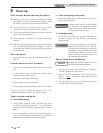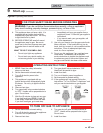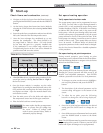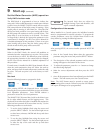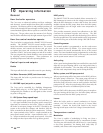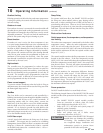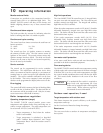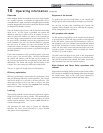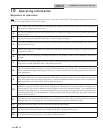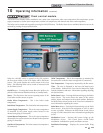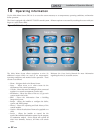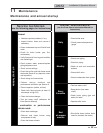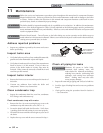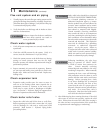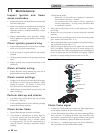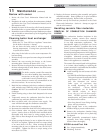
10 Operating information
50
Installation & Operation Manual
Sequence of operation
1.
Upon a call for heat, the control turns on the appropriate pumps (system and boiler pumps for a space heating call,
HW pump for a domestic hot water call).
2.
The control confirms that the low water cutoff contacts are closed and energizes the louvers (optional) and damper
(optional) relays.
3.
The control confirms that the gas pressure switch, blocked drain switch, limits, louver proving switch (optional) and
damper proving switch (optional) contacts close. The Pre-Purge cycle begins.
4.
The control confirms both blowers come up to the desired speed, both blower proving switches close, and the air
pressure switch is closed.
5.
Once the Pre-Purge cycle is complete, the control lowers the blower speeds, initiates sparking of the ignition electrode,
and opens Gas Valve 1.
6.
After a short wait, the control stops sparking and checks for the presence of flame current through the flame sense
electrode.
7.
If the control does not detect flame current, the control will lockout indefinitely, until the RESET button on the touch
screen LCD is pressed. Models FB 1500 - 2500 will have one retry.
8.
If the control detects flame current, the control will hold the blower speed constant for a few seconds to allow the
flame to stabilize, then begin modulating the firing rate in order to maintain the controlling sensor to the desired set
point temperature.
9.
If the current call for heat is for space heating and a HW call for heat becomes active, the control will turn on the HW
pump relay output, then turn off the boiler pump. It will then modulate the blower speed in order to maintain the
outlet temperature to the desired HW outlet set point temperature.
10.
If the first combustion system in the boiler is unable to maintain the desired set point temperature, the second
combustion system in the boiler will be started. Both blowers will modulate to a set speed, and the second gas valve
will be energized. The second combustion system will light from the first combustion system. The second flame will
be monitored much like the first. Once both combustion systems are firing, the control will work in synchronization
to maintain the desired set point temperature. If the heat load should decrease sufficiently, the second combustion
system will be shut down.
11.
Once both the space heating and HW calls for heat are satisfied, the control will turn off the gas valve(s) and begin
the Post-Purge cycle. Any pumps that are running will begin their respective Pump Delay cycles.
12.
At the end of the Post-Purge cycle, the louver relay contacts will de-energize.
13.
The control verifies that the blowers stop running and the blower proving switches open.
14.
At the end of the Pump Delay cycle(s), the pump(s) will be turned off.
Note: This unit is equipped with two (2) gas train systems. Gas Train 1 will fire first. If the demand cannot be met by the first
gas train, the second gas train (Gas Train 2) will fire.



